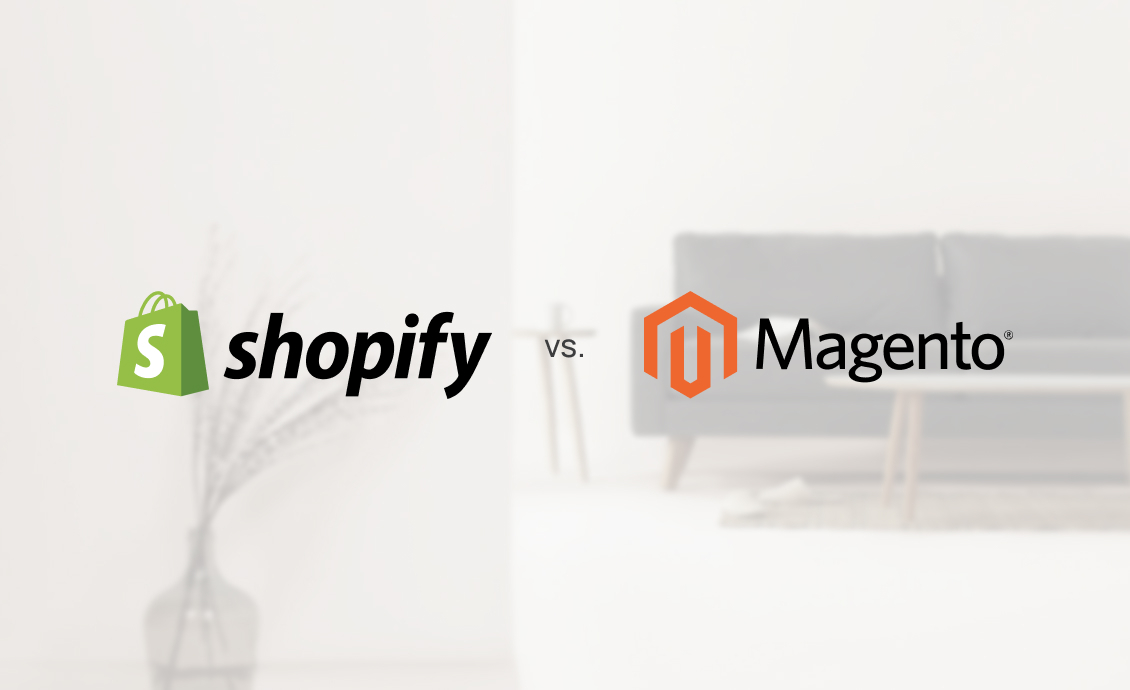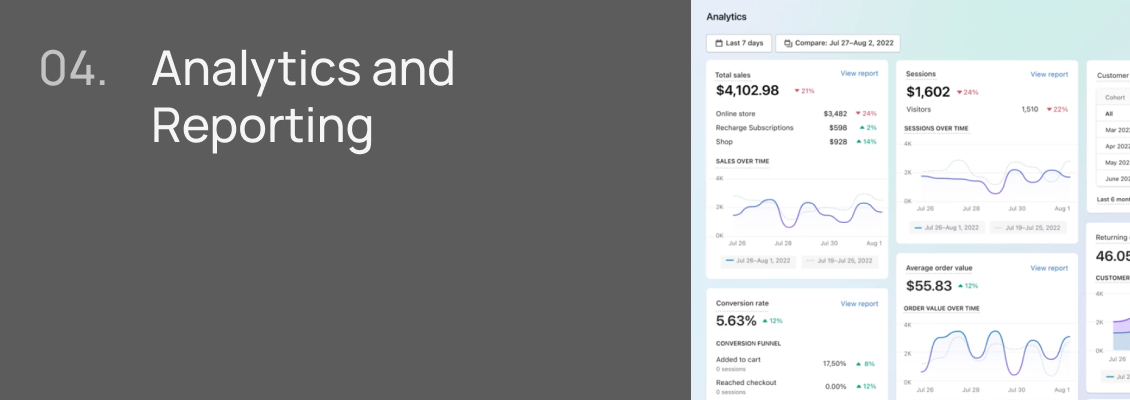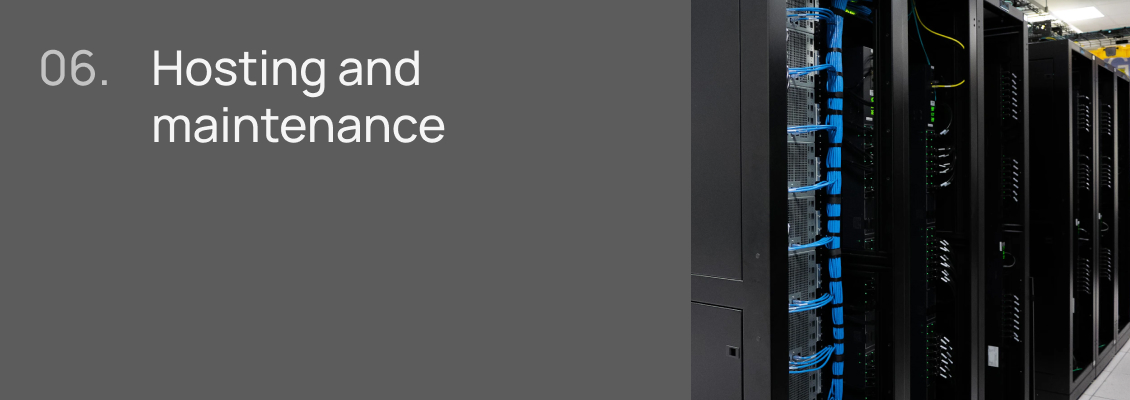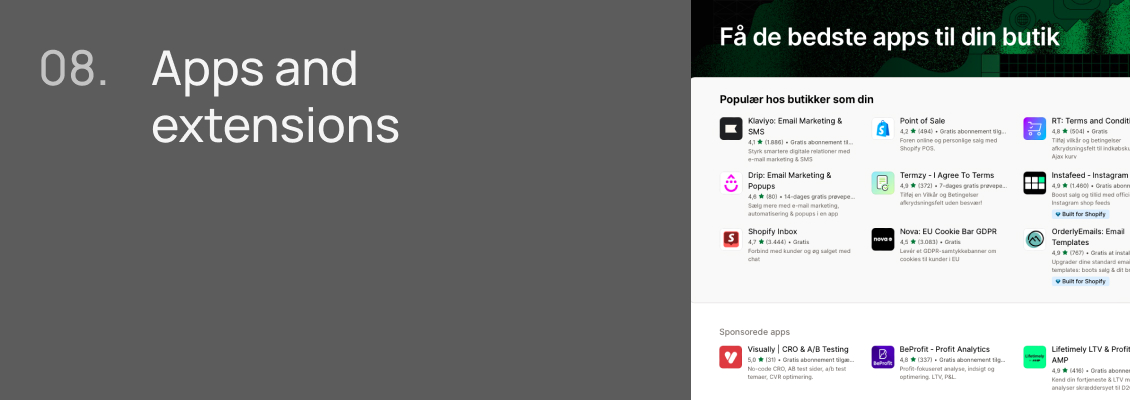
Shopify vs Magento – A comprehensive comparison
What is Shopify?
Shopify is a comprehensive e-commerce platform that enables individuals and businesses to create and manage their own online stores. Known for its user-friendly interface, Shopify allows users with little to no technical background to establish an online presence quickly. With its built-in tools and extensive app marketplace, Shopify provides a flexible and scalable environment, catering to a range of businesses from small startups to large enterprises. Its commitment to providing a seamless shopping experience and round-the-clock customer support makes it a popular choice for online retailers worldwide.
What is Magento?
Magento, on the other hand, is a robust open-source e-commerce platform known for its flexibility and scalability. Magento is designed for tech-savvy users and developers, offering a high degree of customization and control over the user experience. It’s suited for medium to large-sized enterprises that require complex, bespoke e-commerce solutions. Magento’s powerful features and ability to handle a vast array of products and intricate customizations make it a preferred choice for businesses aiming to expand and scale. With its strong community support, extensive marketplace of extensions, and emphasis on mobile-responsive designs and SEO efficiency, Magento stands as a formidable platform for businesses seeking a tailored e-commerce presence.
Shopify or Magento?
Shopify and Magento present unique strengths and features, tailored to cater to diverse e-commerce requirements and objectives. As we delve deeper into this blog post, we will meticulously compare these two platforms, shedding light on their individual nuances. This thorough comparison aims to empower you with the knowledge to make an informed decision, ensuring that the choice you make aligns seamlessly with your business vision and operational needs.

Considering the importance of user experience (UX) is vital when comparing e-commerce platforms like Magento and Shopify. While both platforms aim to offer intuitive interfaces, they cater to different user needs. Read on below to explore how these platforms differ in their approach to UX.
Shopify is known for its simplicity. Shopify stands out for its user-friendly approach. The platform’s intuitive interface and streamlined dashboard make it accessible for beginners, allowing them to effortlessly set up and manage their online store. Additionally, Shopify provides a host of customizable templates and easy-to-use tools, ensuring that even those with minimal technical skills can create an aesthetically pleasing and functional e-commerce site.
Magento on the other hand offers a more powerful set of features, it caters to a more technically adept audience. This platform is ideal for businesses seeking advanced customization and control over their e-commerce operations. Magento’s environment supports extensive customization, complex product catalogs, and a wide array of integrations. However, to fully leverage these features, users often need a background in web development or the ability to invest in a development team.

The appearance and functionality of your online store play a significant role in attracting and retaining customers. Both Shopify and Magento offer robust design and customization options.
Shopify offers a diverse array of themes, both free and premium, which are tailored to various industries and aesthetic tastes. These themes are not just visually appealing but also optimized for a seamless user experience. Shopify’s customizations options, while extensive, are often confined within the boundaries of the chosen theme. This makes it ideal for businesses seeking a balance between attractive design and user-friendly customization without the need for deep technical expertise.
Magento takes customization to another level. As an open-source platform, it grants complete freedom to overhaul and enhance every aspect of the online store. From intricate design changes to intricate functional modifications, Magento caters to those who desire full control over their online presence. However this level of customization requires a profound understanding of web development or the support of a professional development team, making it a go-to choice for businesses with specific, complex requirements and the resources to fulfill them.

In today’s digital marketplace, effective marketing and SEO are crucial for e-commerce success. Shopify and Magento each offer unique capabilities in these areas, catering to different business needs.
Shopify makes marketing more accessible, especially for those without extensive digital marketing experience. Its built-in SEO features ensure that your store is search-engine friendly right out of the box. Shopify also excels in social media integration, allowing businesses to connect seamlessly with their social platforms, and it provides robust support for email marketing and crafting customer-focused campaigns. The ease of use and comprehensive nature of Shopify’s marketing tools makes it a strong choice for businesses looking to manage their digital marketing in-house without the need for specialized expertise.
Magento is known for its robust and advanced SEO features. Magento is the platform of choice for businesses looking to implement a more nuanced and customized search optimization strategy. It offers greater control over SEO elements, which can significantly boost a store’s visibility in search engine results. However, this flexibility often requires a more hands-on approach and can benefit from the input of SEO professionals.
Additionally, Magento’s adaptability makes it well suited for tailored marketing campaigns, though this too might necessitate more direct management compared to Shopify.

Understanding and utilizing data is key to e-commerce success. Both Shopify and Magento offer robust solutions for analytics and reporting, each with its unique strengths and approaches.
Shopify provides comprehensive analytics and reporting features, enabling merchants to track sales, customer behavior, and other vital metrics directly through the dashboard.
Magento also offers robust analytics and reporting options, especially with its advanced versions. Magento users can access detailed insights, but it may involve integrating additional modules or services.
Performance is a critical factor in providing a smooth and enjoyable shopping experience for your customers. Now, let’s explore how Shopify and Magento perform in optimizing site speed, reliability, and overall performance.
Shopify is known for its consistent performance. It provides a hosted solution that ensures fast loading times and reliable uptime. This is particularly beneficial for smaller businesses or those without the resources to manage their own hosting.
With Shopify’s optimized performance, store owners can concentrate on business operations without the technical concerns of website speed and reliability.
Magento allows greater control over performance optimization. The platform can reach high performance levels with the right hosting, caching, and optimization techniques. This often requires a dedicated development team or significant technical expertise. However, Magento’s flexibility in performance optimization is ideal for larger businesses with specific needs and the resources to meet them.
To summarize, Shopify provides an out-of-the-box solution with reliable performance, ideal for those who prefer simplicity and ease of use. In contrast, Magento offers a more customizable environment that, with the right expertise, can be tailored to meet specific performance requirements.

When it comes to launching and sustaining a successful online store, hosting and maintenance play crucial roles. Both Shopify and Magento offer distinct approaches to these aspects, catering to different user needs and preferences.
Shopify operates as a hosted solution, meaning it takes care of both hosting and maintenance for you. This service is included in your monthly subscription fee, providing a hassle-free experience for store owners. Shopify’s infrastructure is designed to ensure fast loading times, strong security measures, and seamless updates. For businesses looking for an all-in-one package that minimizes technical responsibilities, Shopify presents an attractive option. The platform’s robust hosting environment means you don’t have to worry about purchasing separate hosting services or dealing with site maintenance issues like software updates and security patches.
Magento, on the other hand, offers more flexibility but requires a more hands-on approach. Magento’s open-source edition is free to use, but you’ll need to secure your own hosting, which can vary widely in cost and performance. This gives you the freedom to choose a hosting solution that fits your specific needs, whether it’s a shared, dedicated, or cloud hosting service. However, this also means you’re responsible for your site’s maintenance, including applying security patches, updating software, and ensuring your store remains operational and secure.
To summarize, Shopify offers simplicity and ease, making it ideal for those who prefer a hands-off approach while Magento, with its open-source flexibility, caters to those willing to invest in a tailored hosting solution and manage the technical side of an online store.

The way you process transactions plays a key role in both your operational efficiency and how satisfied your customers are. When we compare Shopify and Magento, each offers a unique approach to handling payments.
Shopify simplifies the payment process by offering its native solution, Shopify Payments. It’s designed for seamless integration and ease of use within the Shopify ecosystem. Businesses using Shopify can also access a variety of third-party payment gateways to cater to different customer preferences.
However, it’s important to note that Shopify imposes additional fees for transactions made through payment providers other than Shopify Payments. This could be a crucial factor for businesses that prioritize a wide selection of payment options or those looking to avoid extra transaction costs.
Magento excels in offering extensive flexibility regarding payment integrations. This open-source platform allows businesses to integrate a wide range of payment solutions without incurring extra transaction fees. This flexibility is invaluable for businesses operating in diverse markets or those requiring specific payment functionalities to meet their customer needs. Magento’s approach empowers businesses to select the most fitting payment provider for their particular market, without the constraint of additional costs.
In conclusion, while Shopify provides a streamlined, integrated payment solution, Magento offers broader flexibility in payment integration without the burden of extra fees. Each platform caters to different business needs, making the choice dependent on your specific payment processing requirements and market strategy.
In today’s e-commerce landscape, the ability to enhance and customize your online store with apps and extensions is invaluable. Both Shopify and Magento offer robust options, each with its unique advantages. Let’s take a look.
Again Shopify is renowned for its user-friendly interface. Shopify boasts a rich app store where merchants can find a diverse array of apps and integrations, covering everything from marketing and sales to customer service enhancements. This wealth of options allows store owners to easily expand their store’s functionality and tailor it to their specific business needs.
Magento has with its open-source platform a marketplace brimming with extensions. The strength of Magento lies in its strong community of developers who continually contribute to its expansive range of customizable options. This open-source nature means that the possibilities for custom integrations and extensions in Magento are virtually limitless. It’s particularly well-suited for businesses looking for highly specific or bespoke functionalities that can be tailored precisely to their operational requirements.
In essence, Shopify’s app store offers simplicity and a wide range of functional enhancements for everyday use, while Magento’s marketplace provides in-depth customization potential, ideal for businesses with specific and advanced integration needs.

When it comes to launching and managing an online store, the level of ease and support you receive can significantly influence your operations and growth. Shopify and Magento present two contrasting paradigms in this regard.
Shopify prides itself on exceptional customer support, comprehensive help documentation, and an active community forum. Its platform is designed with user-friendliness as its core, making it an ideal choice for entrepreneurs who may be less tech-savvy or those who prefer to focus more on business than on technical issues. With 24/7 support available, Shopify ensures that assistance is just a call or click away, providing a safety net for businesses at every step of their journey.
Magento offers a different kind of support ecosystem. While it too has a community support system and a range of resources, navigating Magento’s complexities often requires a higher degree of self-sufficiency or even developer expertise. For businesses that choose Magento, especially its open-source version, tapping into the community or hiring a specialist for help is common. Official support, with direct access to Magento experts, is a feature of its paid editions, which might be a consideration for businesses planning their growth.
Again, the choice between Shopify and Magento depends on your business’s unique requirements. If you prioritize ease of use, immediate support, and a hassle-free experience, Shopify might be the platform for you. Conversely, if your vision involves deep customization and you have the resources to handle or invest in technical management, Magento could provide the flexibility and control you seek.

Security is paramount for any e-commerce operation, sitting at the peak of essentials for merchants. In the evolving landscape of internet security, including Google’s stringent requirements, the absence of an SSL certificate can severely impact a site. Websites without SSL face warnings of insecurity, deterring potential customers, alongside risks of cyber-attacks and falling out of compliance with regulatory standards. This lack of security is not only diminishes trust from search engines but also from online consumers.
Shopify simplifies this aspect for store owners by automatically integrating SSL certificates into its platform, ensuring every Shopify store starts with a foundational layer of trust and security.
Magento offers flexibility but places the responsibility on the merchant. Obtaining and installing an SSL certificate on Magento is a separate process, often necessitating a managed hosting provider to ensure the site’s security. This step requires merchants to proactively seek out and secure these essential services, adding an extra layer to setting up a secure e-commerce environment.

Scalability is another critical factor in choosing an e-commerce platform, especially for businesses that anticipate growth. The ability of a platform to scale means it can handle an increasing number of orders, products, and customers without compromising performance.
Shopify shines in scalability with its cloud-based infrastructure, allowing businesses to grow without worrying about server capacity or uptime. Shopify Plus, Shopify’s enterprise solution, offers even greater scalability and control, designed for high-volume merchants and large businesses. The transition between different Shopify plans is seamless, ensuring that businesses can scale up their operations smoothly.
Magento offers unparalleled scalability options, especially for businesses with unique or complex requirements. Magento’s performance and scalability can be extensively customized to meet the needs of growing businesses. However, scaling with Magento often requires significant server resources, optimized coding, and possibly additional extensions. The platform’s open-source edition allows businesses to start small and scale extensively, but moving up the scale might require upgrading to Magento Commerce, involving more sophisticated hosting solutions and potentially higher costs.
In conclusion, both Shopify and Magento offer compelling features in terms of security and scalability, catering to a wide range of business sizes and needs. Shopify provides a more hands-off approach to security and scalability, ideal for businesses looking for simplicity and ease of use. In contrast, Magento offers high levels of customization and control, suited for businesses with specific needs or those prepared to invest in their growth and security infrastructure.
Shopify or Magento: Which is right for you?
Deciding if Shopify or Magento suits your e-commerce site better largely depends on your goals and how experienced you are with creating websites. Shopify is ideal for those just starting out, thanks to its straightforward setup and operation. Meanwhile, Magento caters to more seasoned website builders, offering a rich array of design and customization options that are hard to come by in simpler e-commerce platforms.




